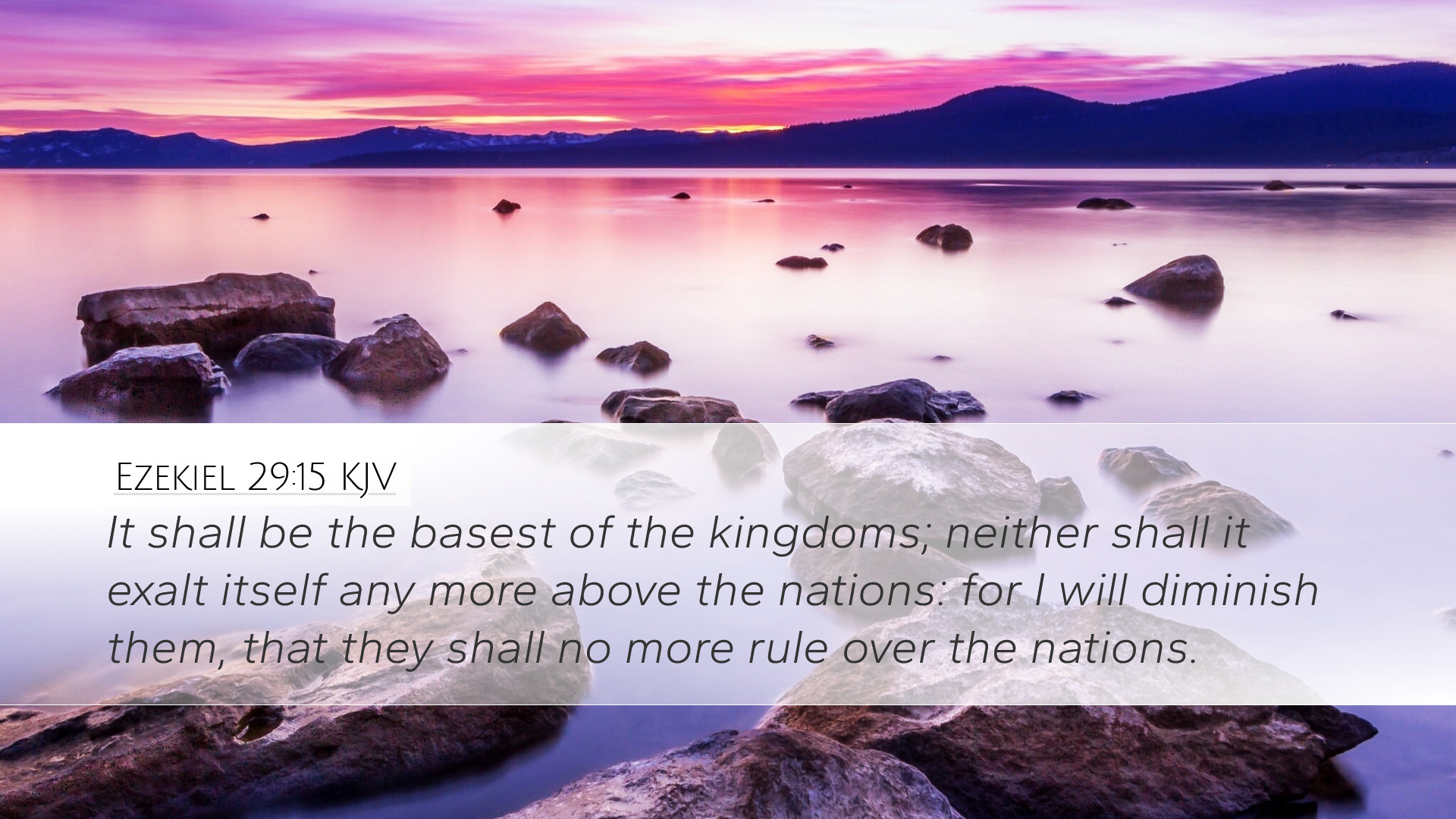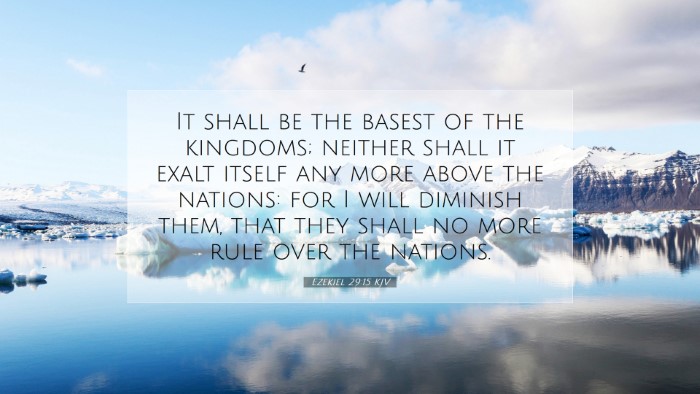Ezekiel 29:15 - Commentary and Insights
Bible Verse: "It shall be the basest of the kingdoms; neither shall it exalt itself any more above the nations: for I will diminish them, that they shall no more rule over the nations." (Ezekiel 29:15, KJV)
Introduction
This verse, part of a broader prophecy against Egypt, captures God's judgment against the nation. Key themes include the degradation of Egypt’s status among nations and the divine authority behind the prophetic declaration.
Contextual Background
The book of Ezekiel is a prophetic text characterized by vivid imagery and strong messages of judgment and hope. In Ezekiel 29, the prophet communicates God’s displeasure towards Egypt due to its pride, idolatry, and mistreatment of Israel. The chapter serves as a stark reminder of God’s sovereignty over all nations.
Commentary Insights
Matthew Henry's Commentary
Matthew Henry posits that God’s judgment on Egypt reveals a critical lesson about national pride and its inevitable consequences. He emphasizes that Egypt, once a towering power, would be brought low, illustrating God’s sovereignty over human authority. Henry reminds the reader that the nations are not merely political entities; they are under God’s moral government.
Henry notes that Egypt's condition will be 'the basest of the kingdoms', indicating a significant fall from grace. The phrase carries the weight of humiliation and reflects how God can strip a nation of its former glory when it stands against His will.
Albert Barnes' Notes on the Bible
Albert Barnes expounds upon the imagery in this verse, pointing out that God’s declaration to 'diminish' Egypt illustrates His direct influence in the affairs of nations. Barnes interprets 'basest' as a term signifying not only a spiritual bankruptcy but also a literal decline in political power.
Furthermore, Barnes emphasizes the idea of Egypt being humbled among nations as a lesson for all nations. He advises that this should instill in the reader a deep respect for God's authority, suggesting that when countries pursue idolatry or pride, they risk losing their status and influence.
Adam Clarke's Commentary
Adam Clarke approaches this passage by focusing on the historical context of Egypt’s fall. He reflects on the consequences of Egypt’s continual rebellion against God and the results that follow such actions. For Clarke, this verse prophetically captures the essence of divine justice, where the oppressors—Egypt in this case—will experience the profound effects of their choices.
Clarke also notes the transforming nature of God's judgment. The prophecy of being 'diminished' implies a transition not only in status but also in influence—Egypt would no longer wield power over other nations, reinforcing God's ultimate control over the Earth.
Theological Themes
- Sovereignty of God: This verse powerfully reflects God’s sovereignty over nations. It communicates that no power can exalt itself against God's will.
- The Nature of Judgment: The decline of Egypt serves as a reminder of the consequences of rebellion against God, challenging modern readers to reflect on the implications of national and personal pride.
- Divine Restoration and Hope: Though judgment is a prevailing theme, the promise of restoration remains. The fall of Egypt illustrates a larger narrative of redemption and the eventual restoration of God's people.
Application for Believers
This scripture encourages believers to recognize the transient nature of earthly power compared to the eternal sovereignty of God. Pastors and theologians can derive invaluable lessons for contemporary society, highlighting the importance of humility, dependency on God, and the dangers of idolatry—whether in a national or personal context.
Students of the Bible may reflect on the historical accuracy of Ezekiel’s prophecies and their implications for understanding God’s relationship with nations throughout history. The profound nature of God’s judgments, as illustrated in Ezekiel 29:15, inspires a thorough contemplation of justice, mercy, and the call to righteousness among all peoples.
Conclusion
Ezekiel 29:15 stands as a poignant reminder of God’s ultimate authority over the realm of nations, offering both a warning and hope. In the reflections drawn from Matthew Henry, Albert Barnes, and Adam Clarke, we are equipped to engage with this text meaningfully, fostering a deeper understanding of how divine principles still resonate in today’s world.


